Join UVM Libraries and Writing in the Disciplines as we explore simple ways to improve your teaching and increase student engagement. Inspired by James Lang’s Small Teaching, the following Book Spotlight titles include lots of teaching, activity, and connection ideas, and can be checked out through the library. Stop by Howe Library and browse the book display!
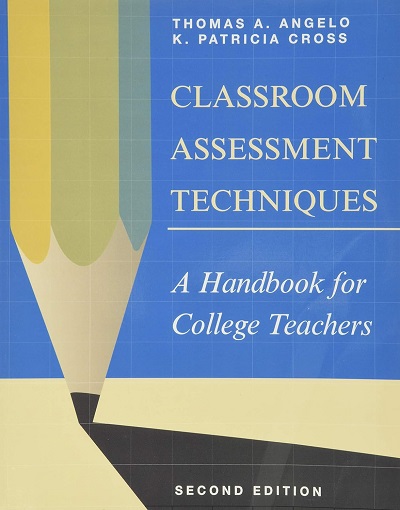
Classroom assessment techniques : a handbook for college teachers by Thomas A. Angelo, K. Patricia Cross
“This revised and greatly expanded edition of their 1988 handbook ... offers teachers at all levels of experience detailed, how-to advice on classroom assessment - from what it is and how it works to how to plan, implement, and analyze assessment projects. The authors illustrate their approach through numerous case studies and examples that detail the real-life classroom experiences of teachers carrying out successful classroom assessment projects.”
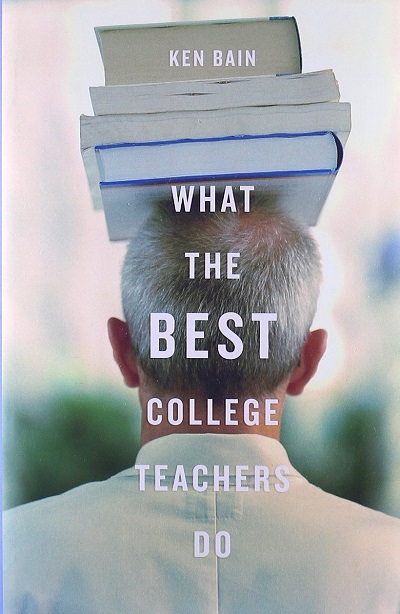
What the best college teachers do by Ken Bain
“What makes a great teacher great? Who are the professors students remember long after graduation? This book, the conclusion of a fifteen-year study, offers valuable answers for all educators. The short answer is--it's not what teachers do, it's what they understand. Lesson plans and lecture notes matter less than the special way teachers comprehend the subject and value human learning. Whether historians or physicists, in El Paso or St. Paul, the best teachers know their subjects inside and out--but they also know how to engage and challenge students and to provoke impassioned responses. Most of all, they believe in two things: that teaching matters, and that students can learn. Bain describes examples of ingenuity and compassion, of students' discoveries of new ideas and the depth of their own potential. This book is a source of insight and inspiration for first-year teachers and seasoned educators.”
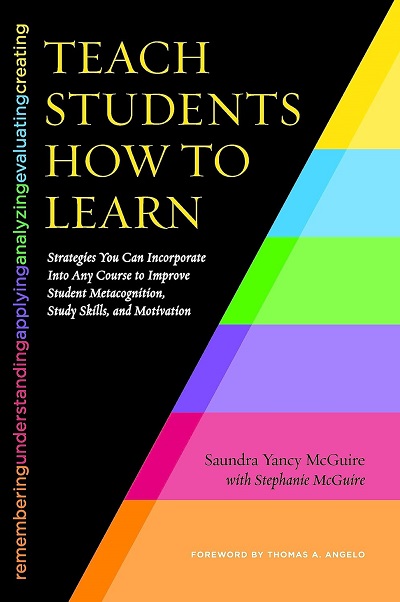
Teach students how to learn : strategies you can incorporate into any course to improve student metacognition, study skills, and motivation by Saundra Yancy McGuire with Stephanie McGuire ; foreword by Thomas A. Angelo
“While stressing that there are many ways to teach effectively, and that readers can be flexible in picking and choosing among the strategies she presents, Saundra McGuire offers the reader a step-by-step process for delivering the key messages of the book to students in as little as 50 minutes. This book is written primarily for faculty but will be equally useful for TAs, tutors, and learning center professionals. For readers with no background in education or cognitive psychology, the book avoids jargon and esoteric theory.”
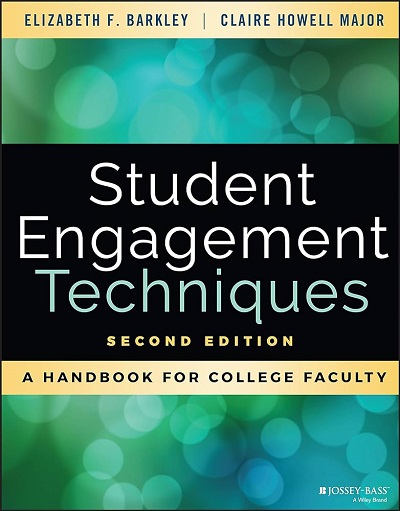
Student engagement techniques : a handbook for college faculty, 2nd Edition (2020) by Elizabeth F. Barkley, Claire Howell Major. (2nd ed)
“This book will provide college teachers with specific tips, techniques, and strategies that will help them motivate and engage students. Modeled after the highly successful Classroom Assessment Techniques and Collaborative Learning Techniques, the book describes learning strategies and techniques drawn from corporate training and education literature. The strategies in the book, broken down into step-by-step directions, offer practical advice on how to increase motivation, promote active learning, build community, help students learn holistically, and ensure students are working in their optimal challenge zone. Each technique includes purpose, preparation, procedures, examples, online implementation, variations and extensions, observations and advice, and key resources. While much of the existing literature on student engagement is general and theoretical, this book emphasizes practical techniques and strategies that have been devised by experienced classroom teachers from a wide variety of disciplines and institutions. Concern over student engagement has become central to conversations regarding quality in higher education. Whether it is faculty frustration about facing classrooms filled with apathetic students or college presidents striving for higher scores on national surveys, keeping students involved, motivated, and acutely learning is challenging educators across the country. Yet, while both external and internal forces are putting pressure on faculty to better engage students, advice on how to accomplish this is not easily accessible.”
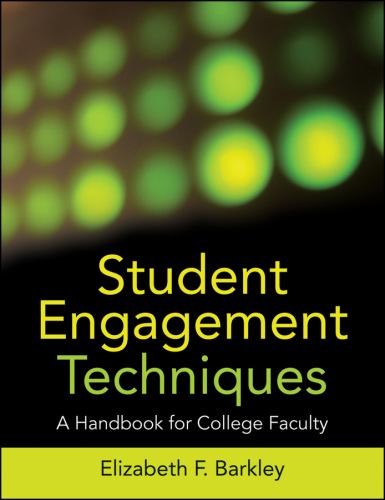
Student engagement techniques : a handbook for college faculty, 1st Edition (2010) by Elizabeth F. Barkley. (1st ed.)
“Keeping students involved, motivated, and actively learning is challenging educators across the country, yet good advice on how to accomplish this has not been readily available. Student Engagement Techniques is a comprehensive resource that offers college teachers a dynamic model for engaging students and includes over one hundred tips, strategies, and techniques that have been proven to help teachers from a wide variety of disciplines and institutions motivate and connect with their students. The ready-to-use format shows how to apply each of the book's techniques in the classroom and includes purpose, preparation, procedures, examples, online implementation, variations and extensions, observations and advice, and key resources.”
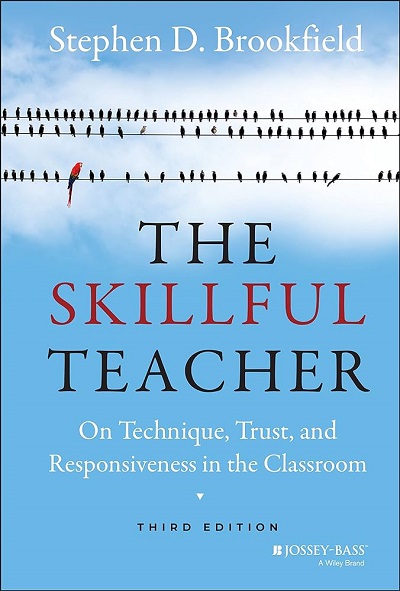
The skillful teacher : on technique, trust, and responsiveness in the classroom by Stephen D. Brookfield
“Energize your classrooms with these key techniques for college teaching students say the best teachers get them excited about learning, stretch their thinking, and keep them actively involved in class. But with increasingly diverse classrooms and constantly changing technology, each semester throws up new challenges for engaging students. Discover how to keep your teaching, and your students, energized with The Skillful Teacher, a practical guide to effective techniques, approaches, and methods for today's college classrooms. Providing insights, reflections, and advice from his four decades of college teaching, Stephen Brookfield now adapts his successful methods to teaching online, working with diverse student populations, and making classrooms truly inclusive. As well as being completely revised, updated, and rewritten, this edition adds six brand new chapters on: Teaching critical thinking Using play and creativity in the classroom Teaching in teams Helping students take responsibility for learning Teaching about racism Exercising teacher power responsibly Readers will delve into what learning feels like from a student's perspective, as well as absorb the wisdom of veteran college faculty with whom the author has worked. Themes from the bestselling previous editions remain, but are revisited and expanded with the perspective of an additional decade in the classroom. This authoritative guide is now even more comprehensive to better serve teachers looking to improve. Whether you are new to the classroom or are looking to rise to new challenges, The Skillful Teacher will provide answers, expand your repertoire of techniques, and invigorate your teaching and your classrooms.
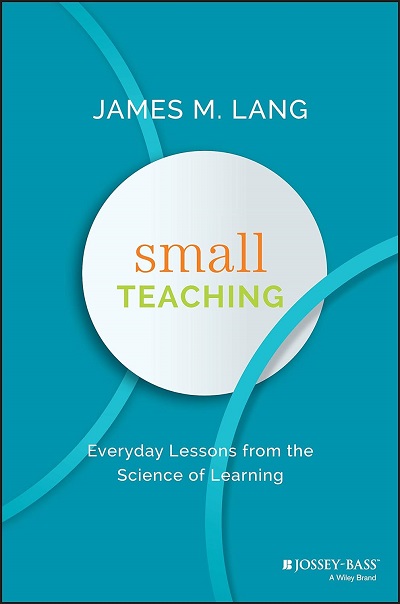
Small teaching : everyday lessons from the science of learning by James M. Lang
"Research into how we learn has opened the door for utilizing cognitive theory to facilitate better student learning. But that's easier said than done. Many books about cognitive theory introduce radical but impractical theories, failing to make the connection to the classroom. In Small Teaching, James Lang presents a strategy for improving student learning with a series of modest but powerful changes that make a big difference--many of which can be put into practice in a single class period. These strategies are designed to bridge the chasm between primary research and the classroom environment in a way that can be implemented by any faculty in any discipline, and even integrated into pre-existing teaching techniques. Learn, for example: How does one become good at retrieving knowledge from memory? How does making predictions now help us learn in the future? How do instructors instill fixed or growth mindsets in their students? Each chapter introduces a basic concept in cognitive theory, explains when and how it should be employed, and provides firm examples of how the intervention has been or could be used in a variety of disciplines. Small teaching techniques include brief classroom or online learning activities, one-time interventions, and small modifications in course design or communication with students."
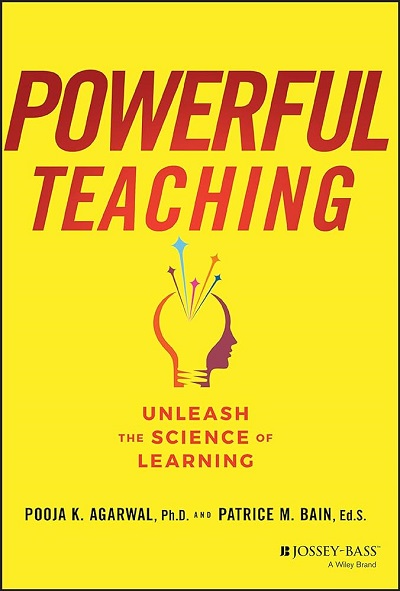
Powerful teaching : unleash the science of learning by Pooja K. Agarwal and Patrice M. Bain
“Unleash powerful teaching and the science of learning in your classroom Powerful Teaching: Unleash the Science of Learning empowers educators to harness rigorous research on how students learn and unleash it in their classrooms. In this book, cognitive scientist Pooja K. Agarwal, Ph. D., and veteran K-12 teacher Patrice M. Bain, Ed. S., decipher cognitive science research and illustrate ways to successfully apply the science of learning in classrooms settings. This practical resource is filled with evidence-based strategies that are easily implemented in less than a minute-without additional prepping, grading, or funding! Research demonstrates that these powerful strategies raise student achievement by a letter grade or more; boost learning for diverse students, grade levels, and subject areas; and enhance students' higher order learning and transfer of knowledge beyond the classroom. Drawing on a fifteen-year scientist-teacher collaboration, more than 100 years of research on learning, and rich experiences from educators in K-12 and higher education, the authors present highly accessible step-by-step guidance on how to transform teaching with four essential strategies: Retrieval practice, spacing, interleaving, and feedback-driven metacognition. With Powerful Teaching, you will: -Develop a deep understanding of powerful teaching strategies based on the science of learning -Gain insight from real-world examples of how evidence-based strategies are being implemented in a variety of academic settings -Think critically about your current teaching practices from a research-based perspective -Develop tools to share the science of learning with students and parents, ensuring success inside and outside the classroom Powerful Teaching: Unleash the Science of Learning is an indispensable resource for educators who want to take their instruction to the next level. Equipped with scientific knowledge and evidence-based tools, turn your teaching into powerful teaching and unleash student learning in your classroom.”
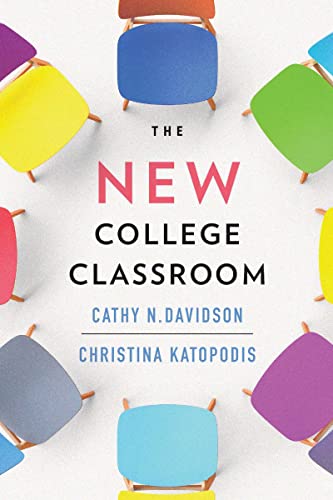
The new college classroom : a practical guide to the future of college teaching by Cathy N. Davidson and Christina Katopodis
“What the latest science of learning tells us about inspiring, effective, and inclusive teaching at the college level. College instruction is stuck in the past. If a time traveler from a century ago arrived on today's campuses, they would recognize only too well the listlessness of the lecture hall and the awkward silence of the seminar room. Yet we know how to do better. Cathy N. Davidson and Christina Katopodis, two of the world's foremost innovators in higher education, turn to the latest research and methods to show how teachers at every kind of institution can help students become independent, creative, and active learners. The New College Classroom helps instructors in all disciplines create an environment that is truly conducive to learning. Davidson and Katopodis translate cutting-edge research in learning science and pedagogy into ready-to-use strategies to incorporate into any course. These empirically driven, classroom-tested techniques of active learning--from the participatory syllabus and ungrading to grab-and-go activities for every day of the term--have achieved impressive results at community colleges and research universities, on campus, online, and in hybrid settings. Extensive evidence shows that active-learning tools are more effective than conventional methods of instruction. Davidson and Katopodis explain how and why their approach works and provide detailed case studies of educators successfully applying active-learning techniques in their courses every day, ensuring that their students are better prepared for the world after college.”
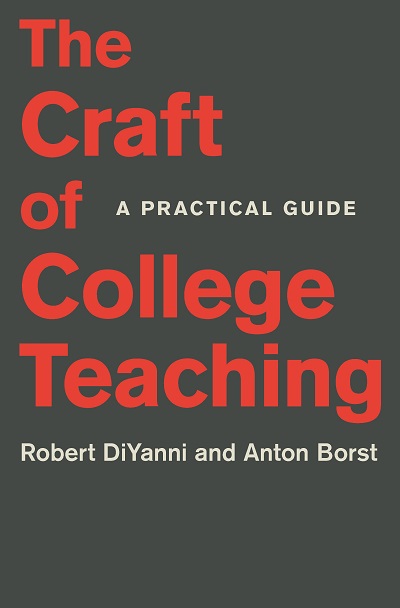
The craft of college teaching : a practical guide by Robert DiYanni and Anton Borst
“The authors provide a guide to the basics of college teaching. Grounded in their own classroom experience, their pedagogical coaching at NYU's Center for the Advancement of Teaching, and their examination of the latest learning science research, it explains how to teach in the college classroom from a learner's perspective-what methods, principles, and activities achieve the best learning outcomes. Chapters address major topics from course and syllabus design to discussion-based teaching, critical reading, and assessment, while brief "interludes" cover various pedagogical elements and applications-including what to do on the first and last days of class and how to incorporate service and experiential learning into curricula. Throughout, the authors provide practical suggestions and strategies, while explaining the underlying pedagogical principles. They also address recent topics that promise to remain fixtures of the educational landscape, such as teaching with technology and teaching in a global context. They steer a middle course on technology, suggesting ways to maximize its benefits while minimizing its distractions. The book coheres around a philosophy of active learning and student engagement. The authors argue that teaching practices should challenge students to think and learn, requiring them to do things with newly acquired knowledge-create models, conduct experiments, debate issues, and more. The authors have enlisted reliable scholarly research to demonstrate that active learning, of the kind they advocate, achieves results: students learn more and better, and their learning is deeper and longer lasting. The authors' pedagogy echoes their epistemology, as they demonstrate how learning and teaching are inextricably intertwined, organic rather than mechanical activities.”
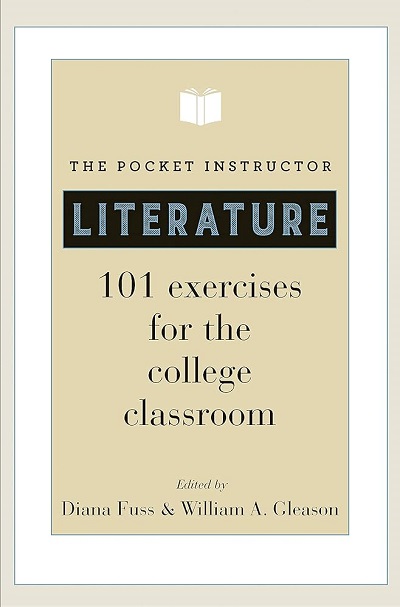
The Pocket Instructor: 101 Exercises for the College Classroom
“These 101 surefire lesson plans present creative and interactive activities to get all your students talking and learning, from the first class to final review. Whether you are teaching majors or nonmajors, genres or periods, canonical or noncanonical literature, medieval verse or the graphic novel, this volume provides practical and flexible exercises for creating memorable learning experiences. Help students learn more and retain that knowledge longer by teaching them how to question, debate, annotate, imitate, write, draw, map, stage, or perform. These user-friendly exercises feature clear and concise step-by-step instructions, and each exercise is followed by helpful teaching tips and descriptions of the exercise in action. All encourage collaborative learning and many are adaptable to different class sizes or course levels.”
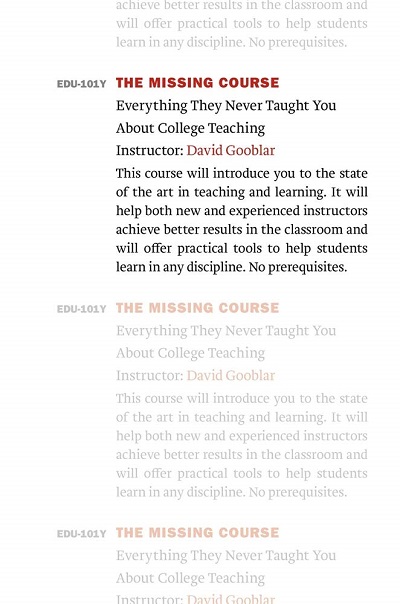
The missing course : everything they never taught you about college teaching by David Gooblar
“Professors know a lot, but they are rarely taught how to teach. The author of the Chronicle of Higher Education's popular Pedagogy Unbound" column explains everything you need to know to be a successful college instructor. College is changing, but the way we train academics is not. Most professors are still trained to be researchers first and teachers a distant second, even as scholars are increasingly expected to excel in the classroom. There has been a revolution in teaching and learning over the past generation, and we now have a whole new understanding of how the brain works and how students learn. But most academics have neither the time nor the resources to catch up to the latest research or train themselves to be excellent teachers. The Missing Course offers scholars at all levels a field guide to the state of the art in teaching and learning and is packed with invaluable insights to help students learn in any discipline. Wary of the folk wisdom of the faculty lounge, David Gooblar builds his lessons on the newest findings and years of experience. From active-learning strategies to course design to getting students talking, The Missing Course walks you through the fundamentals of the student-centered classroom, one in which the measure of success is not how well you lecture but how much students learn. Along the way, readers will find ideas and tips they can use in their classrooms right away.
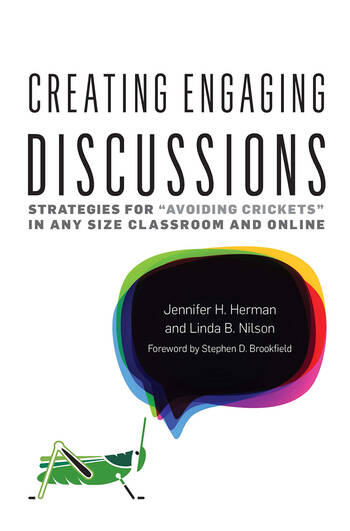
Creating engaging discussions : strategies for "avoiding crickets" in any size classroom and online by Jennifer H. Herman and Linda B. Nilson ; foreword by Stephen D. Brookfield
“If you have ever been apprehensive about initiating classroom discussion, fearing silences, the domination of a couple of speakers, superficial contributions, or off-topic remarks, this book provides strategies for creating a positive learning experience. Jennifer H. Herman and Linda B. Nilson demonstrate how to create the conditions to facilitate deep and meaningful learning as well as to assess the effectiveness of discussions. They identify, analyze, and solve common problems in both classroom and online discussions and in both small and large classes. They take a direct, practice-oriented approach that--in acknowledging common challenges--provides principles, guidance on design, examples of activities and techniques, and eight detailed case studies. These cases demonstrate successful approaches that faculty across disciplines and from a variety of institutions have adopted in their face-to-face, blended, or online courses at the undergraduate or graduate level. The case authors begin by describing the original pedagogical challenge they faced and explain how they addressed it and assessed the results of their innovation. They also offer practical recommendations to readers who may want to try their strategies. Intended for faculty, this book will be equally valuable for educational developers who can use this resource in their programs and private consultations. At the graduate level, this book can serve as a text or workshop resource in college teaching courses and teaching assistant development programs. The final chapter provides a set of resources and activities - including discussion questions on the case studies, writing prompts, and jigsaw formats - that are equally appropriate for individual study or for use in workshop environments. You'll never again have to suffer such a profound silence that, as described by a contributor to the book, she could hear the crickets chirping outside.”
